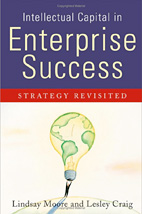Rarely, it seems, do leaders or executives take the time to really think matters through today. Good judgment and deliberative strategic thinking is often eclipsed by trendy digital models of decision making that advocate determinations based on a “blink,” overconfidence, or committing resources on the basis of short-term emotion that later is seen as a poor choice.
Advanced Strategic Thinking
Strategic thinking involves all the topics of strategic planning and the highest thinking about a company or an enterprise, who it is, where it is going, for what purpose, to what end. In particular, strategic thinking in concerned with the development of "competitive strategy" and the development of a sustainable competitive advantage in the marketplace.
Trade Secret Strategy
Trade secrets can often be used to protect company knowledge and invention in instances where patent protection is either not desirable or available. For example, when trade secrets are viewed as an alternative to patent protection they are commonly invoked in instances where the 20 year life of a patent isn’t deemed to be sufficient, or where the knowledge should never be made public (cf. the famous Coca-Cola recipe).
The Strategic Edge (PDF)
Tactical deployment of intellectual assets may bring short-term benefits, but sustainable success depends on thinking and acting strategically. (Originally published in Intellectual Asset Management, London, England)
Uncertainty and Scenario Planning
During the 1990s, under the influence of a booming economy in the Western world, rapidly expanding globalization, and the new rhetoric of business models, even respected business gurus propounded the idea that, because everything was changing so quickly, “planning was dead.”
Does Google’s Purchase of Motorola Suggest It Is Changing Its Strategy?
In a recent editorial in the Wall Street Journal one commentator on the world of business puzzled that Google would so violate the patent rights of their competitors with their Android mobile operating system. He mused incredulously, that Google seems to assume that their competitors in the smartphone market don’t have a right to exclude them from using their intellectual property.
How Do We Think Strategically?
Within today’s rapidly changing corporations, individuals at all levels are increasingly called upon to demonstrate their ability to think strategically. However, many are inadequately prepared to perform this task. Many new executives, and even those long within the executive ranks, are unsure how to properly engage in strategic thinking.
Tech-Transfer Strategy
Tech-Transfer Strategy. Tech-Transfer as an Industry: Since 1980, the transfer of technologies developed at research universities to private industry has become big business in the U.S. During 2003 alone, tech-transfer revenues approached $1.3 billion, and more importantly, the economic benefits that were derived from the technologies that were transferred into the private sector are estimated to have exceed $41 billion in value.
Reverse Engineering for Competitive Advantage (PDF)
Reverse engineering competitors’ formulations is legal, can be ethical and can benefit a company’s strategic position in the marketplace – if it is pursued in the right way. As such, reverse engineering is a powerful product-development tool that can be used to trump even patent-protected formulations or proprietary compounds, thus enhancing a company’s place in the marketplace.
Has Strategy Changed?
Has corporate strategy changed? It seems we are out-of-date every time we turn around. Is there anything that isn’t changing? What about strategy? Has it changed? Today, many question and some undervalue the worth of strategy, believing either that they don’t need it, or that they already have it.






 As the knowledge-based economy expands, the companies and individuals that possess intangible intellectual assets, such as intellectual property, will need specialized expertise, strategic thinking, legal experience, and the wisdom necessary to manage intellectual assets.
As the knowledge-based economy expands, the companies and individuals that possess intangible intellectual assets, such as intellectual property, will need specialized expertise, strategic thinking, legal experience, and the wisdom necessary to manage intellectual assets.